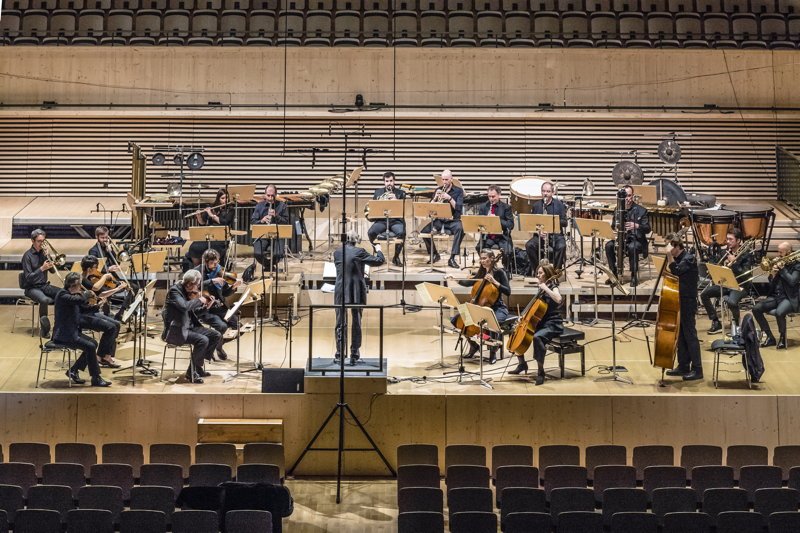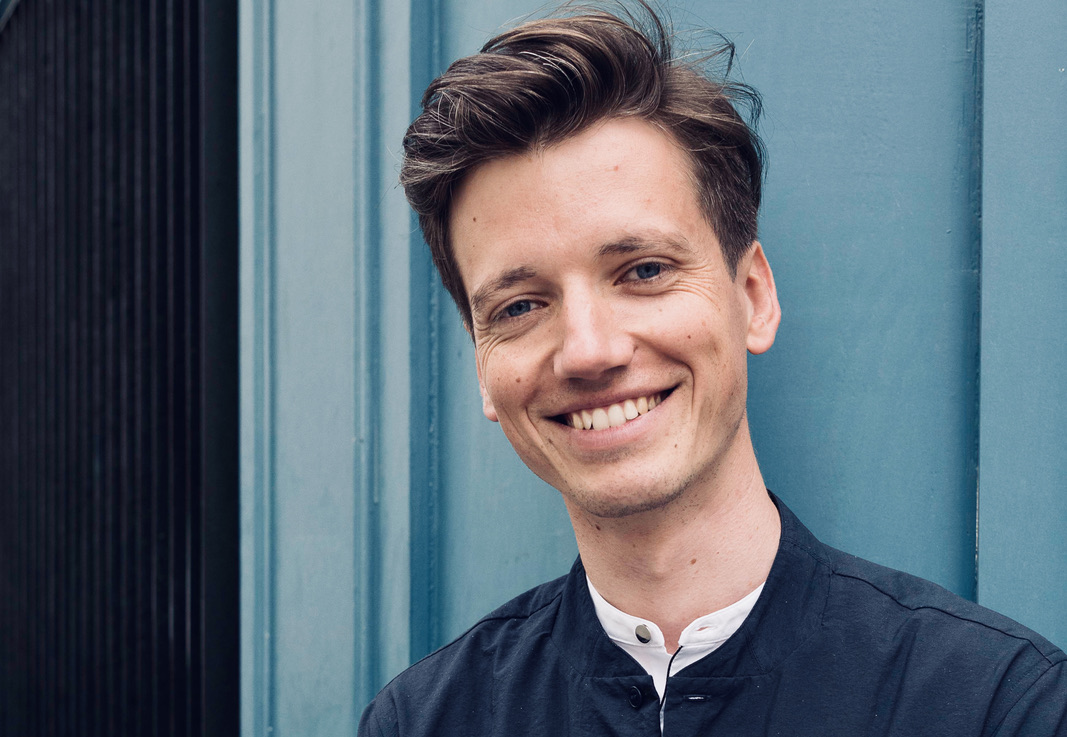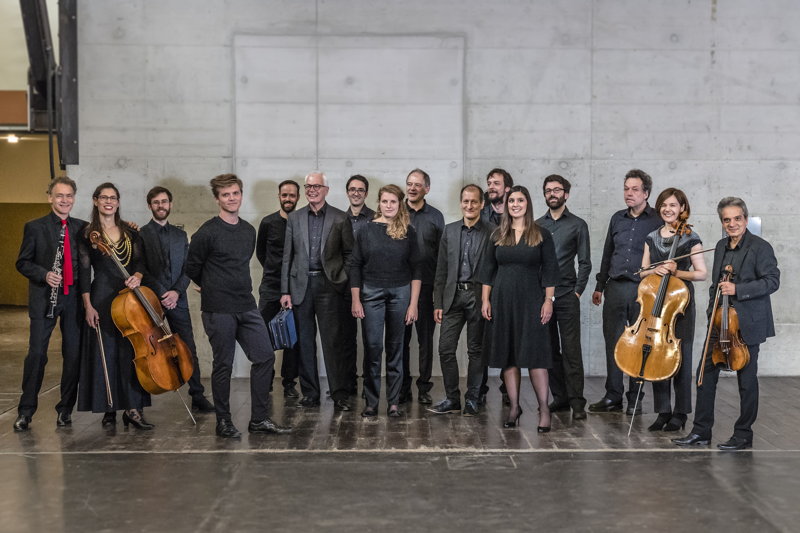Seit Herbst 2019 hat das Collegium Novum Zürich einen neuen künstlerischen Leiter: den Cellisten und Musikwissenschaftler Johannes Knapp. Neue künstlerische Perspektiven und eine Erweiterung der Hörerschaft hat sich Knapp für das Spezialistenensemble der Neuen Musik auf die Fahnen geschrieben. Seine erste Saison fiel Pandemiebedingt reduziert aus. Nun startet die erste von Knapp kuratierte Spielzeit. Thomas Meyer sprach ihn vor dem zweiten Konzert: dieses findet am 30. Oktober unter der Leitung von Emilio Pomàrico im frisch restaurierten grossen Saal der Tonhalle in Zürich statt.

Thomas Meyer
Die Neue Musik ist zwar nicht mehr so jung, aber sie versteht es doch immer wieder, sich zu verjüngen. Das wird deutlich, wenn zwei Werke aufeinandertreffen, die im Abstand von einem halben Jahrhundert entstanden sind, ein Klassiker und ein Newcomer wie im 3. Saisonkonzert des Collegium Novum Zürich (CNZ) unter Michael Wendeberg am 18. Dezember. Éclat-Multiples steht dort neben (Re)incarnation [Yerlik]: ein zentrales Werk von Pierre Boulez aus dem Jahr 1970 neben jenem eines 34 Jahre jungen Komponisten, dessen Namen die wenigsten bei uns kennen dürften. Der Kasache Sanzhar Baiterekov verarbeitet darin einen alten tengristischen Mythos aus seiner Heimat, in dem es um Unterwelt und Wiedergeburt geht.
Solche Begegnungen haben beim CNZ durchaus Tradition. Seit seiner Gründung 1993 verfolgt es diese doppelte Aufgabe. Einerseits führt es die wichtigen Werke der Neuen Musik auf, die gleichsam einen Standard setzen und für die Bildung der MusikerInnen, aber auch des Publikums von Bedeutung sind. Damit hat das CNZ sich seinen festen Platz im Zürcher Musikleben erarbeitet. Einige MusikerInnen sind seit der Gründung mit von der Partie.
Andererseits sucht das Ensemble das junge, unbekannte: die Herausforderung und Öffnung. Eine „Musik, in der sich das Morgen ankündigt“ möchte auch der Cellist und Musikwissenschaftler Johannes Knapp. Vor zwei Jahren übernahm er die künstlerische Leitung und Geschäftsführung. Seine erste Saison fiel coronahalber reduziert aus.

Nur vier Konzerte konnten vor kleinem Publikum stattfinden. Deshalb wurden einige Auftritte für Idagio gestreamt. Zudem nahm das Ensemble drei CD-Projekte in Angriff, die heuer fertiggestellt werden sollen, etwa je eine CD mit Musik von Boulez und des Westschweizers William Blank sowie eine Reihe von Schüler-Lehrer-Doppelporträts wie Heinz Holliger/Sándor Veress oder Klaus Huber/Willy Burkhard. Hubers „Erinnere dich an Golgatha“ stand deshalb am Anfang der neuen Saison.
Klaus Huber, Psalm of Christ, Collegium Novum Zürich, Bariton: Robert Koller, Dirigent Heinz Holliger, Tonhalle Zürich, Eigenproduktion SRG/SSR 2015
Mythen und Legenden
Diesmal liegt ein Fokus auf Mythen und Legenden in aktueller Musik. Das eher als anregende Ausgangsidee denn als durchgängiges Motto. Mythen, so meint Knapp, hätten eine tiefe Verbindung zur Musik, weil sie ebenfalls jenseits von Logik und Worten funktionieren und sich nicht eindeutig fixieren lassen. Es seien Versuche, mit dem Ungewissen, ja dem Schrecken umzugehen.
Und so tauchen in diesen Programmen berühmte Mythen auf: Orpheus in Orpheus falling von Sarah Nemtsov, der Schöpfungsmythos (6. Tag) in Eufaunique von Stefano Gervasoni, der ägyptische Sonnengott Ra in Sortie vers la lumière du jour von Gérard Grisey. Die in Bern lehrende Cathy van Eck wird für den Daphne-Mythos in ihrer neuen Performance die Tonhalle in einen „Wald verwandeln, durch den der Wind weht.“
Gérard Grisey: Sortie vers la lumière du jour (1978), Ensemble Phoenix Basel, Leitung Jürg Henneberger, Eigenproduktion SRG/SSR, Gare du Nord Basel 2016
Schliesslich erscheinen Tierlegenden von Igor Strawinsky (Renard), Ruth Crawford Seeger oder Frank Zappa, die am Ende der Spielzeit erklingen. Der Rockmusiker war in seinen Anfängen stark von Edgard Varèse und Strawinsky beeinflusst.
Begegnung mit Barockinstrumenten
Andererseits werden in solchen Programmen auch die absolutistischen Dogmen Neuer Musik hinterfragt. Warum muss neue Musik immer „neu“ klingen“? Kann sie nicht historische Grenzen überwinden? So kommt es zur Begegnung mit Barockinstrumenten, konkret mit La Scintilla, der Alte Musik-Formation der Zürcher Oper. Der Franzose Philippe Schoeller schreibt dafür ein neues Werk. Kátoptron und erzählt den antiken Mythos von Echo und Narziss neu.
Sie sind also unterwegs. „Crazy nomads of Zurich“ formulierte ein Spassvogel einmal das Kürzel CNZ aus, weil das Ensemble keine feste Spielstätte hat. Stattdessen sucht es immer wieder neue Spielorte auf, heuer die Krypta des Grossmünsters. Und so notiert Knapp denn auch in seinem Saisoneditorial: „Reisen als ein Erwandern von Klanglandschaften mit dem Ohr. Kunst heisst, nie anzukommen.“
Thomas Meyer
Pierre Boulez, Sanzhar Baiterekov, Sarah Nemtsov, Stefano Gervasoni, Gérard Grisey, Frank Zappa, Igor Strawinsky, Ruth Crawford Seeger, Edgar Varèse, La Scintilla, Philippe Schoeller, Emilio Pomàrico, Christoph Delz, Dahae Boo, Kelley Sheehan, Michael Wendeberg

Kommende Konzerte CNZ:
Grosse Tonhalle Zürich, 30.10.21: And falls into the Netherworld, Dirigent: Emilio Pomàrico, Werke von Sarah Nemtsov, Aureliano Cattaneo, Rebecca Saunders, Stefano Gervasoni
Grosse Tonhalle Zürich, 4.12.21: Konzert 3, Dirigent: Johannes Schöllhorn, Stefan Wirth Klavier; Werke von Kelley Sheehan, Tobias Krebs, Dahae Boo, Christoph Delz
Sendungen SRF 2 Kultur:
Neue Musik im Konzert, 1.12.21: Konzert CNZ, Tonhalle Zürich, 30.10.21
neo-profiles:
Collegium Novum Zürich, William Blank, Heinz Holliger, Sandor Veress, Klaus Huber, Willy Burkhard, Cathy van Eck, Gare du Nord, Ensemble Phoenix Basel, Rebecca Saunders, Tobias Krebs

